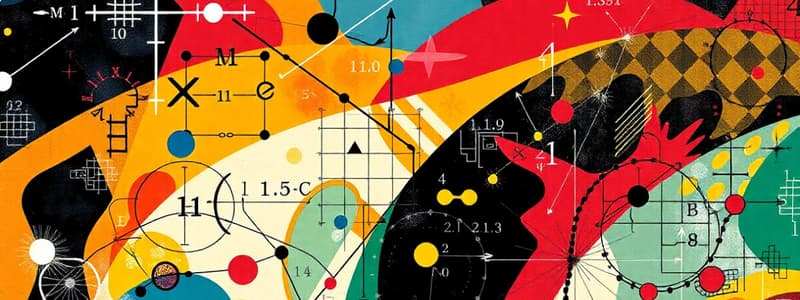Podcast
Questions and Answers
Which branch of mathematics deals with shapes, sizes, and positions of figures in space?
Which branch of mathematics deals with shapes, sizes, and positions of figures in space?
- Arithmetic
- Algebra
- Geometry (correct)
- Calculus
What is the name for a collection of objects in mathematics?
What is the name for a collection of objects in mathematics?
- Set (correct)
- Function
- Equation
- Expression
What is the main focus of trigonometry?
What is the main focus of trigonometry?
- Collecting and analyzing data
- Basic operations on numbers
- Rates of change
- Relationships between angles and sides of triangles (correct)
Which of these is NOT a basic mathematical operation?
Which of these is NOT a basic mathematical operation?
What is the purpose of a mathematical proof?
What is the purpose of a mathematical proof?
Which type of reasoning starts with specific observations and makes general conclusions?
Which type of reasoning starts with specific observations and makes general conclusions?
In which field is mathematics used for designing structures and machines?
In which field is mathematics used for designing structures and machines?
What is the branch of mathematics concerned with collecting, analyzing, and interpreting data?
What is the branch of mathematics concerned with collecting, analyzing, and interpreting data?
Flashcards
Arithmetic
Arithmetic
Basic operations on numbers: addition, subtraction, multiplication, division.
Algebra
Algebra
Uses symbols to represent unknown values and solve equations.
Geometry
Geometry
Studies shapes, sizes, and positions of figures in space.
Calculus
Calculus
Signup and view all the flashcards
Statistics
Statistics
Signup and view all the flashcards
Probability
Probability
Signup and view all the flashcards
Deductive reasoning
Deductive reasoning
Signup and view all the flashcards
Inductive reasoning
Inductive reasoning
Signup and view all the flashcards
Study Notes
Branches of Mathematics
- Arithmetic handles basic number operations (addition, subtraction, multiplication, division).
- Algebra uses symbols for unknowns, solving equations.
- Geometry studies shapes, size, and position in space.
- Trigonometry explores relationships between triangle angles and sides.
- Calculus deals with rates of change and accumulated quantities.
- Statistics collects, analyzes, and interprets data.
- Probability measures the likelihood of events.
Fundamental Concepts in Mathematics
- Numbers: Natural (1, 2, 3,...), integers (..., -3, -2, -1, 0, 1, 2, 3,...), rational (fractions), irrational (non-fractional), and real numbers (all of these).
- Sets: Collections of objects, define and study relationships.
- Operations: Basic mathematical actions (addition, subtraction, multiplication, division).
- Equations: Statements of equality between expressions; solve to find unknown values.
- Functions: Relationships between inputs and outputs; often shown as formulas or graphs.
- Variables: Symbols for unknown quantities.
- Expressions: Combinations of numbers and variables linked by operations.
Key Mathematical Tools
- Formulas: Equations describing relationships between variables, like area and volume.
- Graphs: Visual representations of data and functions.
- Diagrams: Drawings illustrating mathematical concepts.
- Mathematical proofs: Deductive reasoning for statements' truth.
- Problem-solving skills: Critical thinking and logic for problem solutions.
Mathematical Reasoning
- Deductive reasoning: Starts with broad principles, applies to specifics.
- Inductive reasoning: Identifies patterns, develops generalizations.
- Logic: A system of rules defining valid reasoning.
- Proof techniques: Methods to demonstrate statement validity (logic & axioms).
Applications of Mathematics
- Science: Wide use for modelling and predicting in physics, chemistry, and biology.
- Engineering: Crucial in structural, machine, and system design.
- Finance: Used to calculate interest, investments, and assess risk.
- Computer science: Used in algorithm design, data structures, and cryptography.
- Business: Helps forecast, budget, and make informed decisions.
Studying That Suits You
Use AI to generate personalized quizzes and flashcards to suit your learning preferences.




